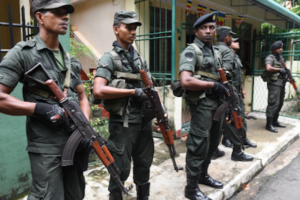Arrests of Ramzy Razeek and Hejaaz Hizbullah raise concerns over freedom of speech

July 03, 2020
Suvarna Hapugoda, a rights activist, has urged the Sri Lankan government to follow due process in detentions and arrests and to respect international norms and universal rights.
She said those who actively disseminate misinformation, incite ethnic and religious hatred and violence, and engage in cyber bullying, predominantly against ethnic and religious minority communities, continue to enjoy impunity and political patronage.
Hapugoda called on authorities to uphold the fundamental rights to freedom of speech and expression of Ramzy Razeek and lawyer Hejaaz Hizbullah.
Razeek, a retired government official, was arrested on April 9 for allegedly violating the International Covenant on Civil and Political Rights and cybercrime laws.
In an open letter to the Human Rights Commission of Sri Lanka, the Liberation Movement called for the unconditional release of Razeek to protect the civil and political rights of Sri Lankans.
Razeek has a history of criticizing Muslim fundamentalism and racism in Sri Lanka. The post made on April 2, for which he was arrested, called for a “jihad [struggle] of thought” against all forms of fundamentalism and racism targeting Sri Lanka’s Muslim community.
“Razeek very specifically states in his post that he is proposing a struggle of ideas and intellect to question and counter the attacks against progressive Muslims from outside as well as within the Muslim community,” said the Liberation Movement.
Razeek regularly writes posts advocating harmony between Muslim and Buddhist communities.
“Two days later, Razeek posted again to say that he had received countless death threats as a result of his post, and that many had misconstrued his words, calling for him to be jailed for propagating racist ideas,” said the Liberation Movement.
He has been detained for over 81 days without explicit evidence being produced. He has also been deprived of medical treatment, posing a great risk to his already fragile health.
Police arrested prominent lawyer Hizbullah on April 14 under the Prevention of Terrorism Act. He was one of six people, including the brother of a former minister and a customs official, police have detained for their alleged involvement in the 2019 Easter Sunday attacks.
Police also arrested several students on allegations of publishing false information on Facebook and maliciously criticizing public officials involved in Covid-19 prevention programs.
Some 117 rights activists, including nine Christian priests and six human rights bodies, said Hizbullah has not been informed of the reason for his arrest.
“Although the authorities failed to inform Hizbullah, his family or his lawyer of the reason for the arrest, they convened a press conference on April 15 at which they stated he was arrested in relation to the Easter attacks of April 2019,” said the rights activists in a statement.
They requested the chief justice take note of the apparent interference by law enforcement authorities in the right of an officer of the Supreme Court to practice his profession freely and make necessary interventions to ensure attorneys-at-law are able to perform their duties without fear.
The Core Group on Sri Lanka at the UN Human Rights Council on June 30 called on the government to follow due process in detentions and arrests and comply with international norms and universal rights.
The group noted that Hizbullah has been detained for almost three months without charge or presentation before a court.
Rights workers have asked the government not to use measures to tackle the Covid-19 pandemic as an excuse to roll back human rights.
The UK’s international ambassador for human rights, Rita French, delivered a statement at the 44th session of the UN Human Rights Council on June 30 calling on the Sri Lankan government to ensure that the country’s democratic space remains open and accountable.
“We share the concerns of Sri Lankan human rights organizations over the targeting and marginalization of minority groups, the pardoning of Sergeant Sunil Rathnayake and promotion of others accused of serious violations during the conflict [civil war], and the militarization of a wide range of civilian functions and public initiatives,” said French.
On March 26, President Gotabaya Rajapaksa granted a presidential pardon and released death row prisoner and mass murderer Sunil Rathnayake, a former army staff sergeant convicted for his part in a massacre in December 2000 in which eight Tamil civilians died.

